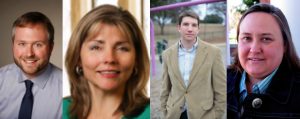As we approach this year’s SENCER Summer Institute, we wanted to take a moment to share some details of this year’s program with you. The central theme of this year’s Institute is transformation, which is expressed throughout several facets of our work this year, from continued progress on current projects to our pursuit of opportunities emerging from new partnerships and initiatives. More specifically, the major aims for this year’s program include conversations about the STEM reform ecosystem, examples of SENCER work on campus and of the SENCER approach in real-world problems, and assessment of SENCER work. To address these aims, we have put together a slate of outstanding plenary speakers.

Dr. Sean Gehrke, director of Institutional Planning, Research, and Assessment at Lewis-Clark State College in Lewiston, Idaho, will deliver the opening plenary address. His talk will outline the conclusions of an NSF-sponsored study of national STEM reform initiatives that identified SENCER as a “community of transformation”. Gehrke, who was co-author of the study, will provide an overview of how key communities of practice in STEM reform have developed into communities of transformation, a new type of educational community exemplified by SENCER. He will also review the broader research findings, which suggest ways that members of these communities can leverage their assets and resources to transform learning on their home campuses.
Dr. April Hill, professor and chair of biology at the University of Richmond, will give a plenary address titled “SENCER, Transforming STEM for Majors, and It’s About Time, Too.” The address will focus on how April works to transform the STEM experience for students with integrated, interdisciplinary, and inclusive courses that focus on real-world problems, authentic research, and research-based pedagogies. April uses these methods to enhance courses for first-year students as well as science majors.
Dr. Adam Briggle, associate professor of philosophy at the University of North Texas, will introduce the SENCER community to field philosophy at the Institute. Field philosophy, which eschews a disciplinary approach to understanding problems in favor of an on-the-ground examination of them, will be the main focus of Adam’s talk. He will explain the field philosopher’s approach to wicked problems and the similarity of that technique to SENCER’s methods. He will also offer a critique of disciplinarity as a limited way of understanding these problems, using his involvement in the fracking debate as an example.
Dr. Alix Dowling Fink, dean of the Cormier Honors College and associate professor of biology at Longwood University, will close the Institute. She will reflect on the insights and lessons learned during her many years of participation in the SENCER national community of transformation and how that participation has shaped her work on general education and the biology major at her institution, and catalyzed collaborations with informal education institutions.
In addition to our traditional plenary structure, the SSI 2016 plenary addresses will also include interactive sessions where members of our community will respond to our speakers and begin conversations about the next steps required to advance the solutions we formulate.
Other topics that will be covered in this year’s program include:
- Civic Intersections of STEM and Humanities
- Communities of Transformation: Maximizing Impact
- Public Engagement with Science
- Foregrounding Quantitative Literacy in Civic Life
- Science and Technology for Social Good
- Leading Change: Aligning Institutional and Personal Priorities
We will also offer core sessions on course design and research-based approaches to learning. As is our custom, analysis of the needs expressed in SSI registrations will further guide the plans for our programming.
You can still register to participate in the SENCER Summer Institute and attend these plenary sessions and the rest of the program. Please go here to sign up.
In the coming days, we will also make announcements about the sessions proposed by participants during early registration. If you would like to propose a session during the regular registration period, please complete the form by May 16, 2016.
